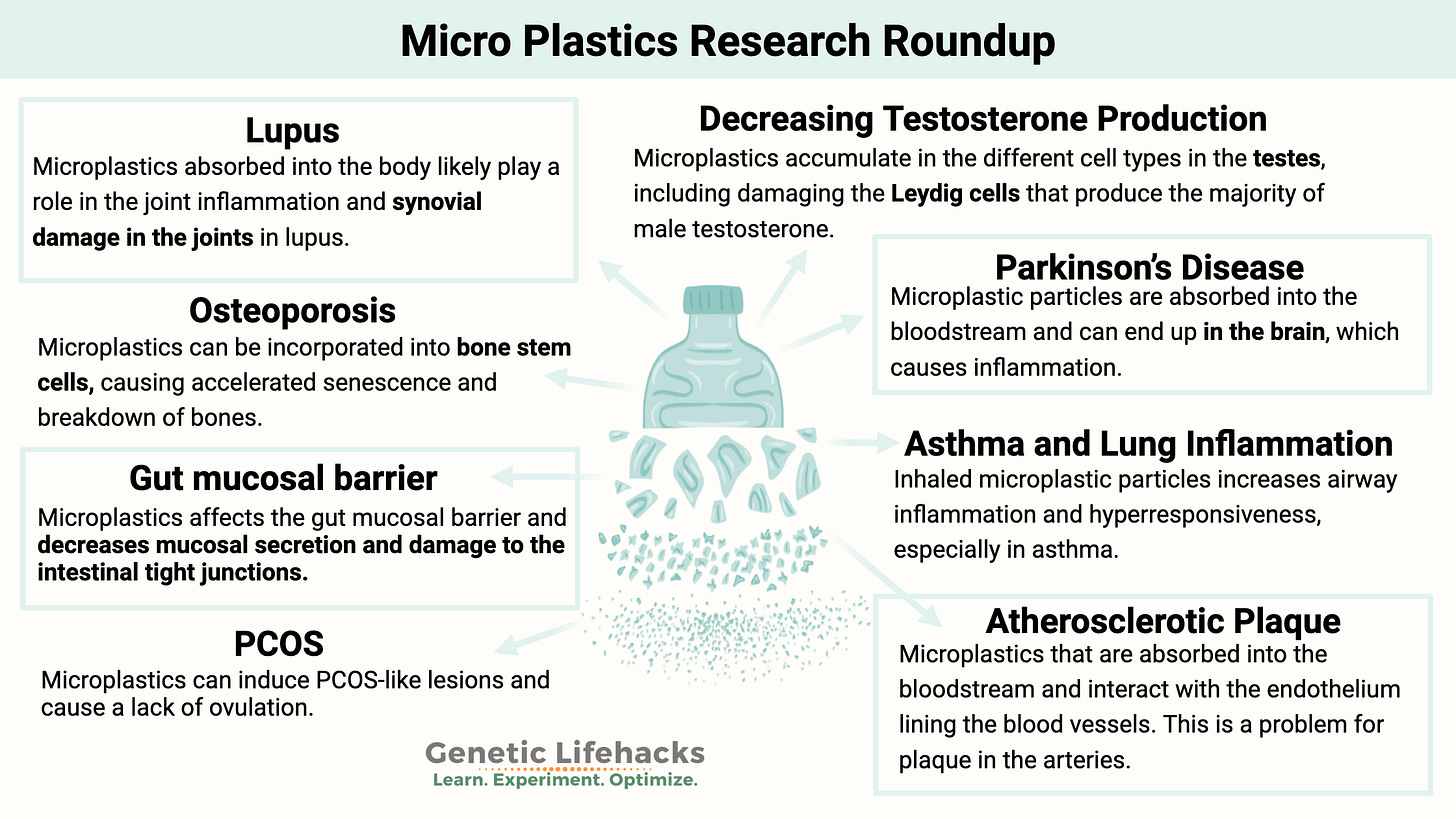Have you ever started taking a supplement and two months later can't remember why you're taking it?
I've done that more times than I care to admit...
I've added a couple of new printable supplement tracker forms for members. You can use them to track which supplements you're taking, which gene/topic you're addressing with the supplement, and what outcome you're looking for. If you're more of a spreadsheet person, you could use the forms as inspiration for your own tracking system. There are also tracking apps available, but please be sure to read the privacy policies carefully before putting all of your personal medical information into an app. The adage, "If it's free, then you're the product", definitely applies to your personal information in a tracking app.
I've written before about my growing concern about the effects of microplastics and nanoplastics on health. This week, I took some time to update a bunch of Genetic Lifehacks articles to include the latest studies on microplastics.
Like most environmental factors, the negative health effects of microplastics likely interact with genetic susceptibility. The new article below is a roundup of the research to showcase the interactions with health and genetic susceptibility. The article ends with ideas for mitigating the risk.
Finally, I want to thank everyone who took the time to drop me a note with suggestions for topics and improvements for Genetic Lifehacks in 2025.
I'm blown away by how smart and thoughtful you all are! This is going to be a great year.
Gratefully yours,
~ Debbie
Microplastics Research Roundup
Key takeaways:
~ An avalanche of new research shows that microplastics are likely a real problem for many chronic health issues.
~ Understanding your genetic susceptibility – along with your microplastic exposure – can help you prioritize diet or lifestyle changes for optimal health.
~ Simple and inexpensive changes can reduce your exposure.
What are Microplastics and how do they interact with genetics?
Genetic susceptibility to a condition is exacerbated by diet, lifestyle, and environmental factors. I say that over and over in Genetic Lifehacks articles.
The latest research shows that microplastics are being absorbed into the body. This is an “environmental factor” that can combine with genetic susceptibility in multiple ways. This is a significant problem that increases chronic disease and decreases quality of life.
New on Longevity Lifehacks:
L-glutamine for Gut Barrier Function: Does Longevity Begin and End with Gut Barrier Function?
This article looks at the clinical trials and research studies on using l-glutamine to improve intestinal barrier function.
What I've been reading:
Chlorpheniramine Maleate is an inexpensive OTC antihistamine (brand name Chlor-Trimeton, and many inexpensive store brands). This randomized placebo-controlled clinical trial showed that the long Covid risk was much lower in the group that used chlorpheniramine nasal spray. It was a prospective study that included 259 participants who were also given standard care for Covid along with the nasal spray. In the placebo group, 17 ended up with long Covid symptoms. In the group taking chlorpheniramine maleate as a nasal spray, 0 had long Covid. Larger studies are definitely needed on this.
2.) ADHD, Austim - Among Offspring Prenatally Exposed to Systemic Glucocorticoids
This is an interesting study on autism and ADHD risk due to prenatal glucocorticoid exposure. Glucocorticoids, like dexamethasone, are sometimes given to pregnant women at risk of preterm birth. Women with inflammatory or autoimmune disorders often are on glucocorticoids. The study shows an increased relative risk of ADHD and autism in the children who were exposed prenatally.
The study compared within-group risk e.g. maternal autoimmune/inflammatory on glucocorticoids vs. not on glucocorticoids. The results showed an RR=1.5 (50% increased relative risk) of autism or ADHD in the group that the mothers were given glucocorticoids due to a risk of preterm birth.
Similarly, the results showed an RR of 1.3 for both autism and ADHD in the autoimmune glucocorticoid group.





